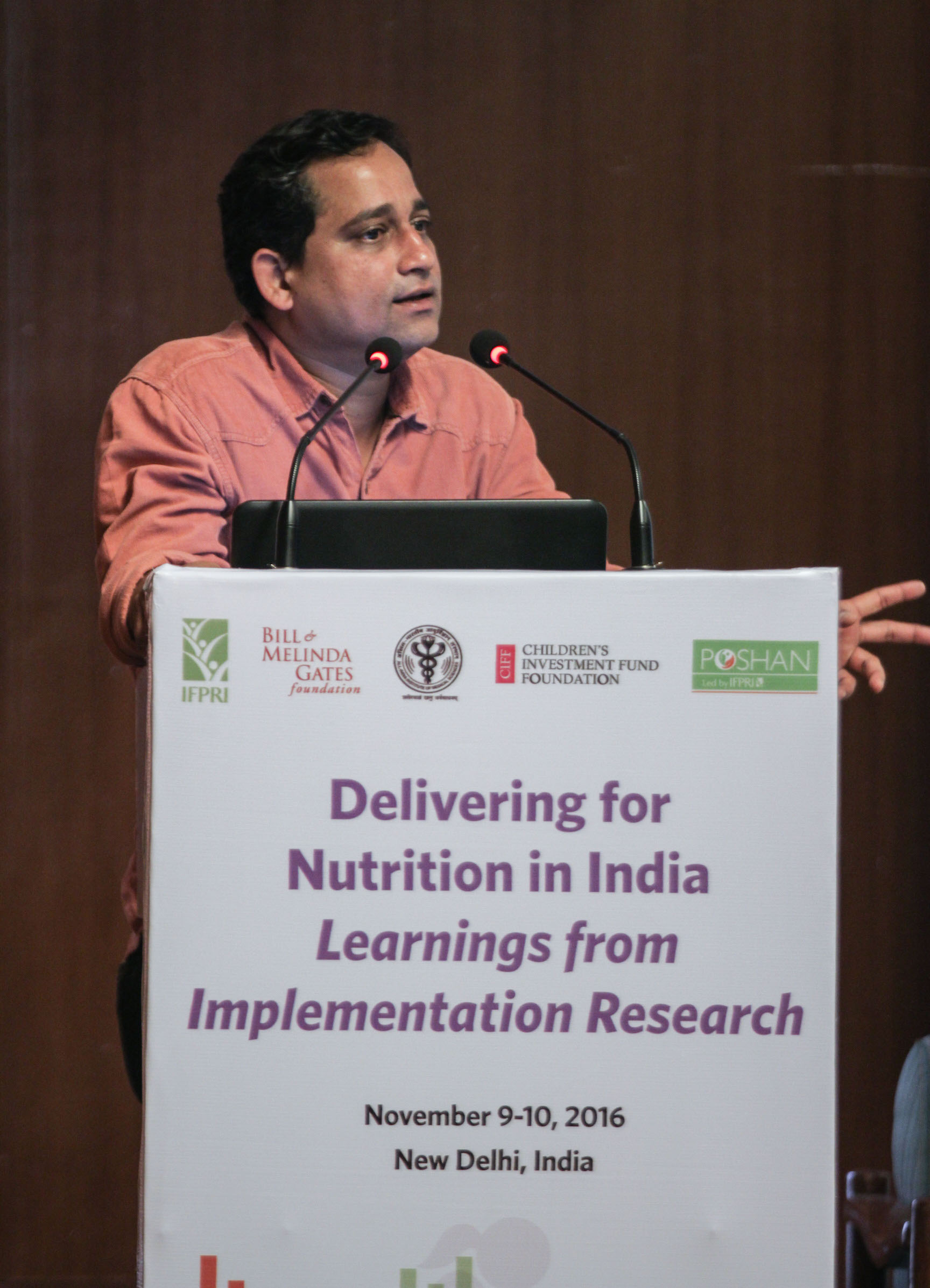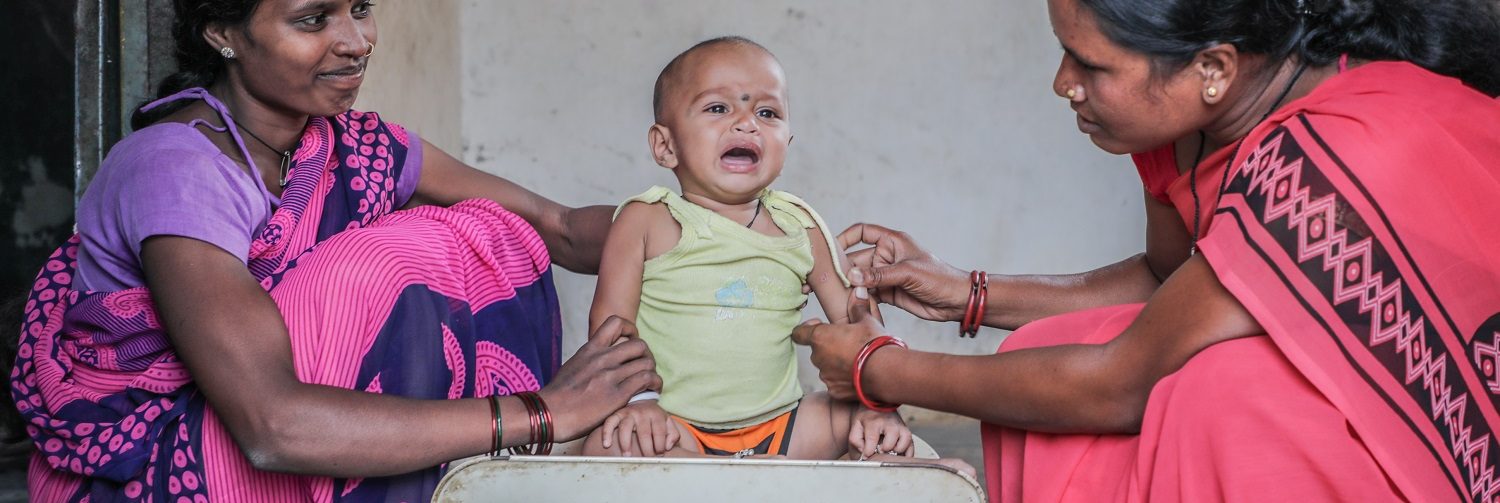The Supplementary Nutrition Program (SNP) component of the Integrated Child Development Scheme (ICDS) and the mid-day meal scheme are two of the key food supplementation programs offered by the Government of India. The SNP provides a daily snack and hot cooked meal for 3–6-year-old children at the anganwadi centre and take home ration (THR) for children under 3 years of age, pregnant and lactating women, and adolescent girls. Food supplementation is therefore an integral part of the Government of India’s efforts to combat malnutrition in the country. With this in mind, POSHAN’s Delivering for Nutrition in India: Learnings from Implementation Research conference (November 9-10, 2016), had a dedicated session on food supplementation.
 Chaired by Dr. Monica Jain from the International Initiative for Impact Evaluation (3ie) and Mr. Biraj Patnaik, Principal Adviser to the Commissioners of the Supreme Court, the session featured four unique presentations on studies on implementation of food supplementation programs in India. The presentations shed light on the state-level coverage of the SNP, production mechanisms for fortified food and the impact of fortified supplementary food on malnutrition.
Chaired by Dr. Monica Jain from the International Initiative for Impact Evaluation (3ie) and Mr. Biraj Patnaik, Principal Adviser to the Commissioners of the Supreme Court, the session featured four unique presentations on studies on implementation of food supplementation programs in India. The presentations shed light on the state-level coverage of the SNP, production mechanisms for fortified food and the impact of fortified supplementary food on malnutrition.
The session began with Mr. Salil Kumar from the Tata Trusts making a strong case for decentralized production of take home ration in the ICDS. By presenting findings from GAIN’s pilot in Rajasthan, he showed the viability of decentralized production units run by women’s SHGs to ensure delivery of good quality food to anganwadi centres and to lead to women’s empowerment. According to him, various enabling conditions like the maturity of SHG and payment guarantee by government can lead to replication of the model across India.
Both Mr. Ronald Abraham from IDinsight and Mr. Biraj Patnaik spoke about delivery of THR and hot cooked meals under the ICDS, focusing on specific states. Mr. Abraham presented the results from IDInsight’s quantitative assessment of ICDS in Bihar that reveal significant resource gaps, implementation gaps and pilferage in delivery of food supplements in the state. The study conducted between 2012 and 2015 shows that the THR program for 6–36 months old children and hot cooked meals for 3–6 year old children in Bihar were essentially non-existent and that reforms are hard to achieve. Mr. Patnaik compared data from two surveys, the Focus on Children under Six (FOCUS, 2004) and the Progress of Children Under Six (POCUS, 2014), conducted in six states, namely Tamil Nadu, Himachal Pradesh, Maharashtra, Chhattisgarh, Rajasthan and Uttar Pradesh. The data from the two surveys shows that overall the ICDS has only improved moderately. With respect to supplementary nutrition, the survey shows that there is no monitoring of nutritional content of THR and that community awareness about the source of THR is low when the production model is centralized. The survey thus supports Mr. Salil Kumar’s argument for a decentralized model of THR production.
Ms. Urmi Bhattacharya from the Abdul Latif Jameel Poverty Action Lab (J-PAL), presented evidence from J-PAL’s randomized control trial in Odisha on impact of micronutrient fortification of mid-day meals. The results show that provision of micronutrient mix to schools significantly increases zinc and vitamin A levels in mid-day meals, but has no significant effect on indicators of malnutrition such as hemoglobin levels, height-for-age and weight-for-age and mid-upper arm circumference.
The presentations were followed by an intense Q&A session where the audience discussed their various queries with the speakers. The participants of the conference also had the opportunity to listen to Mr. Prasanth Kumar Reddy, Director of Social Welfare and ICDS, Government of Odisha, who shared his experiences in the implementation of SNP in Odisha. He acknowledged that while Odisha is a state with high coverage of SNP, there are still many challenges with respect to monitoring the quality and supply of the THR.
The session served as a platform for increasing awareness of existing implementation research on food supplementation programs amongst practitioners and academics, and deliberate on strategies for improvement of the programs.
Written by Amrutha Jose Pampackal, IFPRI
Related resources:
POSHAN Research Note: A Review of the Integrated Child Development Services' Supplementary Nutrition Program (forthcoming, April 2017)
Nutritional Guidelines for Complementary Foods and Complementary Food Supplements Supported by GAIN


